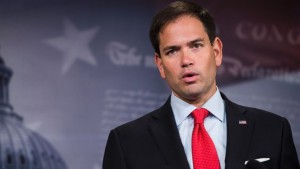(ThyBlackMan.com) Without a doubt, Senator Marco Rubio performed poorly in the first part of the New Hampshire debate. Even he admits it. Governors Chris Christie and Jeb Bush spent the days after the Iowa Caucus openly declaring war on Rubio’s ascendant campaign–questioning Marco Rubio’s conservative convictions and casting him as a stereotypical politician meticulously crafted by Frank Luntz focus groups. In the Saturday debate, the only debate between the Iowa Caucus and the New Hampshire primary, Christie led the way in battering Marco Rubio–sending the young senator into a Howard Hughes loop of repetition that earned him well-deserved booing.
The Granite State cast its votes. No candidate came close to Donald Trump’s decisive victory; least of all, Marco Rubio, who fell from second to a fifth place finish. In spite of Rubio’s impressively broad collection of endorsements, his supporters must consider whether New Hampshire represents a minor setback, or if the wax on Rubio’s wings have melted. As Republicans consider this and reevaluate the  landscape, looking forward to South Carolina, a nagging question still remains: Who benefited from the debate attacks?
landscape, looking forward to South Carolina, a nagging question still remains: Who benefited from the debate attacks?
Governor Christie fueled the attacks on Marco Rubio, arguing that America’s electing a smooth-talking, first-term senator in 2008 led to the dire straits the country finds itself in now. Therefore, he argues, a vote for Marco Rubio would be a vote for a similar outcome.
Forget, for now, the superficiality of the argument (which I address in the “On Rubio’s Experience” section of a prior article). Even had Christie not dropped out of the race after the primary, would the attack have helped him at all? His attacks on Rand Paul didn’t help him. Nor did he gain from his routine, categorical attacks on senators, which always led him into his own “memorized 25-second speech” about the difference between being a senator and being a governor–a speech that always ended with a dark and disturbing promise about not letting Hillary Clinton within 15 feet of the White House.
Governor Bush turned on his protegee during the New Hampshire debate when asked why he’s flip-flopping on his view of Rubio’s qualifications to be president.
“Marco Rubio is a gifted, gifted politician,” Bush said, “and he may have the skills to be a President of the United States, but we’ve tried it the old way with Barack Obama, with soaring eloquence and…we didn’t get a leader we got someone who wants to divide the country up.”
Let’s examine Bush’s causation-correlation fallacy: Barack Obama used soaring rhetoric and eloquence to win his party’s nomination, and then proceeded to divide the country as president. Therefore, because Marco Rubio speaks eloquently, we should not vote for him to win our party’s nomination for fear that if he wins the presidency, he will do the same.
Bush’s absurdities didn’t end there. The former governor, brother of the last Republican president and son of the Republican president prior, went on to attack Marco Rubio in an interview with Glenn Thrush arguing that the son of a maid and a bartender had “never been challenged in his life.”
Despite this, Bush only earned about 1,200 more votes than Rubio–amounting to his campaign spending more than $1,200 per vote.
So did the attacks work? Sure, if the goal was to harm Rubio’s ascendancy. But did how did they serve the attackers? The Party? The voters?
Of course, none of these people benefited from the scurrilous attacks, except maybe Marco Rubio, himself. Perhaps his debate performance will make him more self-aware. Maybe he will learn how to better take heat and recover. Maybe–but only if he learned some important lessons from the event.
Clearly, for example, Marco Rubio does not handle attacks well. He responds to petty slights in kind: calling Rand Paul an isolationist, criticizing Christie for New Jersey’s credit downgrades and for not returning fast enough to his state after a snowstorm, etc. Only once did he successfully parry an attack, and that was from Jeb Bush in a much earlier Iowa debate. Perhaps, Rubio simply does not like going after other Republicans. Whether or not that is the case, he can benefit from this weakness by remembering that he bested Bush by taking the high road. Going forward, he can expect to sustain more friendly fire. If Rubio learns that he does best when he stays above the fray, he will have benefited from this experience.
Similarly, Rubio must become more self-aware. He hopefully understands that his response to Christie’s charges was self-defeating. Not only did he play into Christie’s narrative, but he also focused on Barack Obama–someone who will not be on the ballot in 2016. This went against the inspirational tenor of his campaign. If, instead, Marco Rubio learns to stay focused on the challenges of tomorrow, rather than the politicians of yesterday, he will have benefited from this experience.
As the Republican race stands now, negativity reigns supreme: Trump insults everyone, Cruz does as well, and Bush does no better. Only Governor Kasich, Ben Carson and Marco Rubio have focused their campaigns on defeating the Democrats and improving the country. If Rubio can remain optimistic and positive, he will solidify himself as the most electable Republican, and the party and American voters will have benefited from this experience.
Written by Joseph Hunter
Official website; http://blackandredblog.wordpress.com/

















Leave a Reply